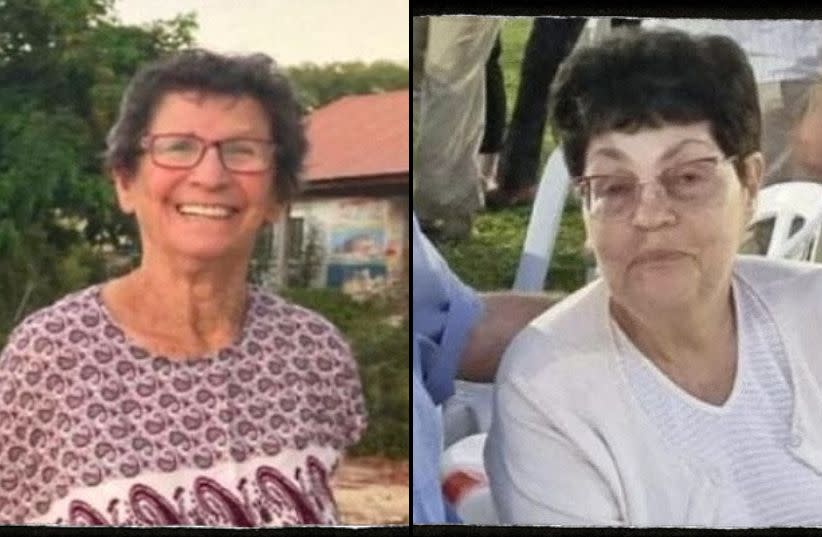An elderly Israeli hostage released by Hamas on Monday night said terrorists beat her as she was taken into Gaza on October 7 but was then well-treated during her two-week captivity in the Palestinian enclave.
Yocheved Lifshitz, 85, was one of two women freed late Monday, leaving around 220 hostages still in the hands of Hamas.
Seated in a wheelchair, a frail-looking Lifshitz told reporters at Tel Aviv Sourasky Medical Center that "I have been through hell" but that a doctor had visited her while she was held in a network of tunnels within Gaza and that all her needs had been taken care of.
"They went wild in our kibbutz," the former captive told reporters. "They blew up the fence we built for two and a half billion dollars. They attacked our houses. They killed and kidnapped both old and young with no distinction."
Lifshitz described the situation as a "nightmare we couldn't have imagined" and one that she keeps "repeating in my mind."
When they captured her, she said, they put her on a motorcycle with her legs tied on one side and her head on the other and then raced her through the fields. There were motorcycles on either side and also one behind.

"As we rode, the motorcycle rider hit me with a wooden pole," Lifshitz recalled. "They didn't break my limbs, but it hurt me a lot in that area, making breathing difficult. They stole my watch and jewelry while I was on the motorcycle."
She was at first held in Abasan al-Kabira, near Kibbutz Be'eri and Khan Yunis in the southern Gaza Strip. After that, she did not know where she was taken.
"Eventually, we went underground and walked for kilometers in wet tunnels, for two or three hours in a spider web of tunnels," she recalled. "We went through the tunnels until we reached a large hall. We were 25 people, and they separated us according to which Kibbutz we were from. There were five of us from Kibbutz Nir Oz."
Former captive: Hamas fed us white cheese, cucumbers
According to Lifshitz, Hamas put the prisoners on mattresses in their cells and assigned a guard for each prisoner. The guards spoke with their prisoners and ate white cheese and cucumbers with them. They said they did not want to talk about what happened. Instead, "they spoke about all sorts of other things. They were friendly in their way."
In addition, a doctor would come every few days and examine the hostages and provide them with medications as needed. She said they cared for the wounded.
"A person with us had been severely wounded on his hands and legs by a motorbike crash on the way. It was heartbreaking to see that," Lifshitz recalled. But she said they gave him antibiotics, and that he was doing better when she was released.
"They were very concerned with hygiene and were worried about an outbreak of something. We had toilets which they cleaned every day," she continued.
Former captive: IDF was not prepared for October 7 massacre
Lifshitz claimed the IDF was not prepared for the events of October 7.
"We were very hurt by the fact that the IDF did not know [this was going to happen]," she charged. "They warned us three weeks prior when masses arrived at the fence and sent incendiary balloons to burn our fields. The IDF did not address this seriously.
"Then, suddenly, on Saturday morning, when everything was quiet, there was a heavy bombardment," she continued. "We were left to fend for ourselves."
In contrast, she said Hamas seemed prepared for the massacre it carried out.
"They were prepared for this. They were prepared for a very long time," she said.
Hamas said on Sunday that it released Lifshitz and a second woman, Nurit Cooper, 79, on health grounds after taking them and more than 200 others hostage in the massacre that left more than 1,400 people dead.
Lifshitz was kidnapped with her 83-year-old husband, Oded, who is still in captivity.
Lifshitz is a peace activist who, together with her husband, helped sick Palestinians in Gaza get to hospital for years.
"They are human rights activists, peace activists for all their life," grandson Daniel Lifshitz told Reuters in Tel Aviv shortly before his grandmother's release was confirmed. "For more than a decade, they took... sick Palestinians from the Gaza Strip – not from the West Bank, from the Gaza Strip – every week from the Erez border to the hospitals in Israel to get treatment for their disease, for cancer, for anything."
After the press conference, several questions were raised about how such an event occurred without the knowledge of the Prime Minister's Office or the Shin Bet (Israel's Security Service) - and formal preparation by the hospital.
The hospital said Sourasky did not request the press conference, nor did it guide the family ahead of the event.
"The hospital said the family and the media requested an organized, coordinated dialogue," the hospital said. "Guiding the family regarding the nature and content of the messages is not our responsibility but is in the hands of the relevant security and official public diplomacy authorities who are in direct contact with the family."
Reuters contributed to this report.
